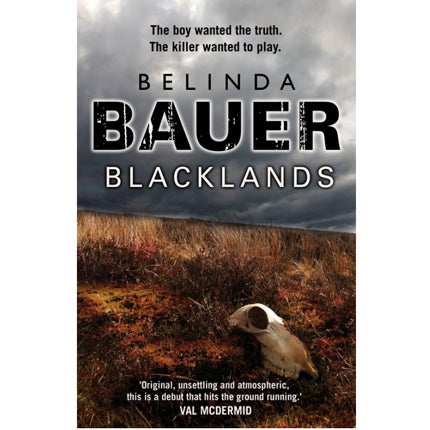Blacklands, By Belinda Bauer
Debut novel with the killer instinct

Your support helps us to tell the story
From reproductive rights to climate change to Big Tech, The Independent is on the ground when the story is developing. Whether it's investigating the financials of Elon Musk's pro-Trump PAC or producing our latest documentary, 'The A Word', which shines a light on the American women fighting for reproductive rights, we know how important it is to parse out the facts from the messaging.
At such a critical moment in US history, we need reporters on the ground. Your donation allows us to keep sending journalists to speak to both sides of the story.
The Independent is trusted by Americans across the entire political spectrum. And unlike many other quality news outlets, we choose not to lock Americans out of our reporting and analysis with paywalls. We believe quality journalism should be available to everyone, paid for by those who can afford it.
Your support makes all the difference.Belinda Bauer brings two great attributes to an often-exploited genre, the novel of crimes against children. First, much of her story is told from a child's viewpoint. In so much fiction of this kind, a child is a mere hook on which to hang the story.
But Bauer's 12-year-old Steven has such a convincing voice that the reader can really feel for the suffering of this boy in a sad family. It has experienced the dread of a having a small son go missing, with the probability that he has been murdered. The novel portrays the painful long-term effects of such a tragedy: the semi-neglect of a remaining child, the emotional hardening of the adults, and above all the "lack of closure" which afflicts the mother.
Steven determines to try to find the body of long-lost Billy, at first by digging almost at random on Exmoor, then by a much more dangerous stratagem. He contacts the man most likely to have been the killer, a prisoner serving a life sentence for the murder of other children. Steven, who grows up before our eyes as we see him beginning to understand the adult world, becomes not only a potential victim, but a determined aggressor, perhaps the killer's nemesis.
Bauer also demonstrates an uncanny ability to get under the skin of that other essential character in crime fiction: the murderer. Whether Arnold Avery, a cunning and cold-blooded lifer, is based on a realistic picture is not the point – although Bauer seems to have done her research thoroughly. What matters is that her portrait of the psychopath chills the blood. The reader is fully gripped by the battle of wits between Arnold and Steven, at first in coded letters and then, after a prison riot allows Arnold to break out and roam the moor, in a hunt which doesn't allow one to put the book down. Bauer's first novel shows an extraordinary power of imagination and, vital in crime fiction, the ability to create fear and empathy in the reader.
Join our commenting forum
Join thought-provoking conversations, follow other Independent readers and see their replies
Comments